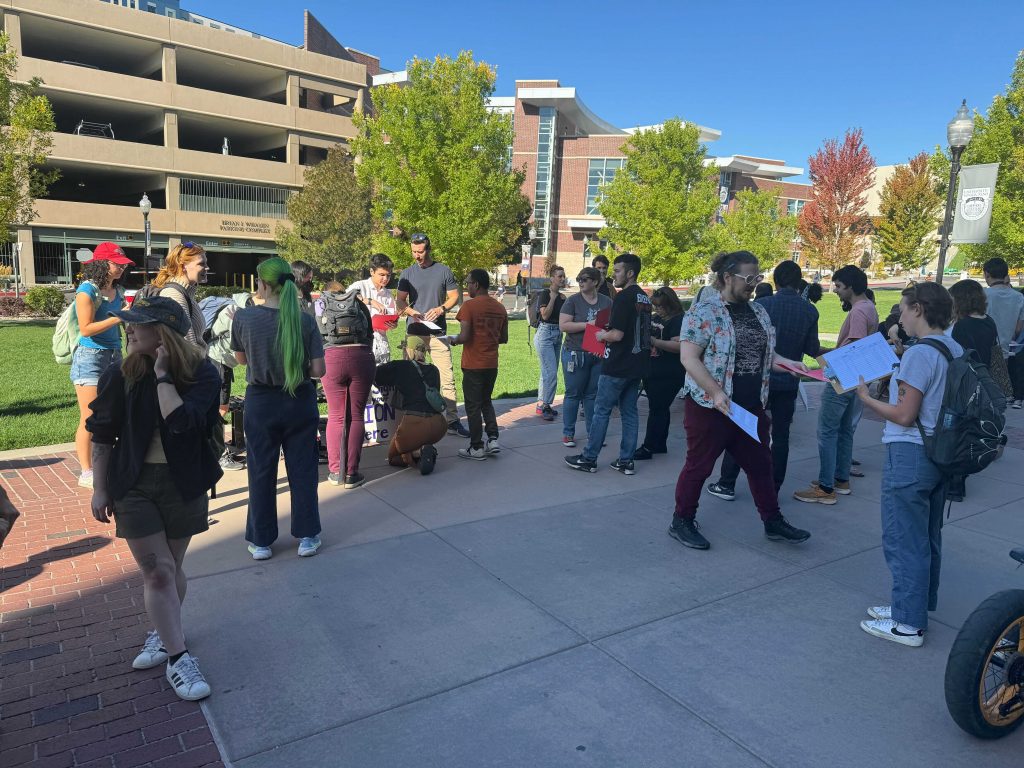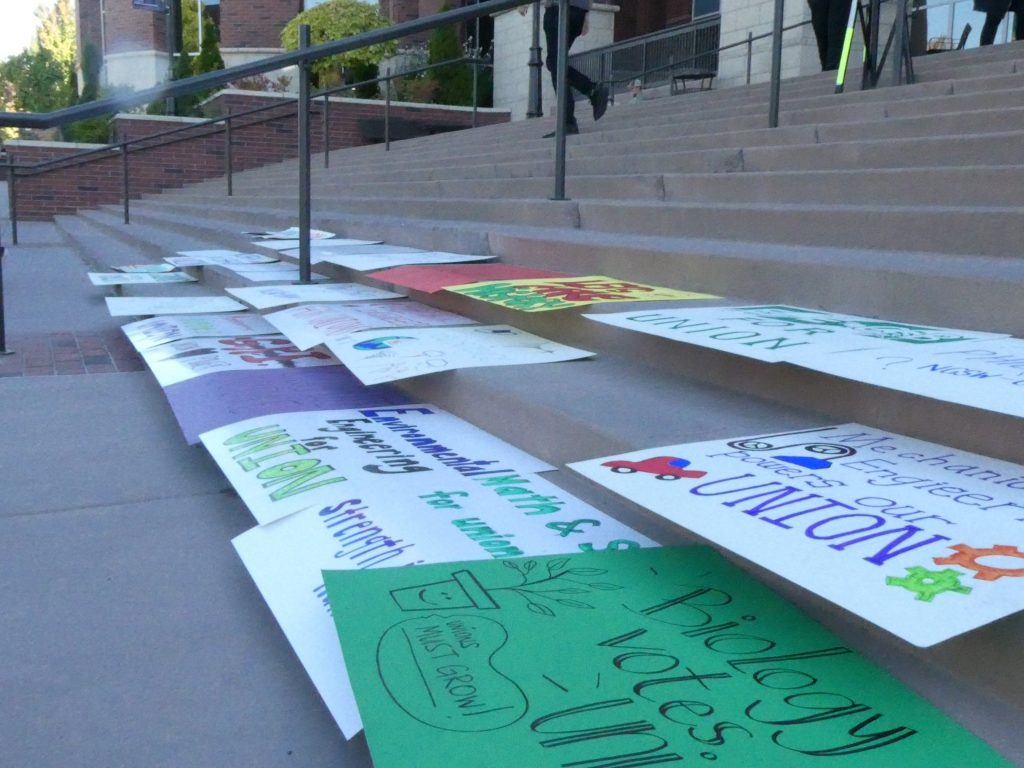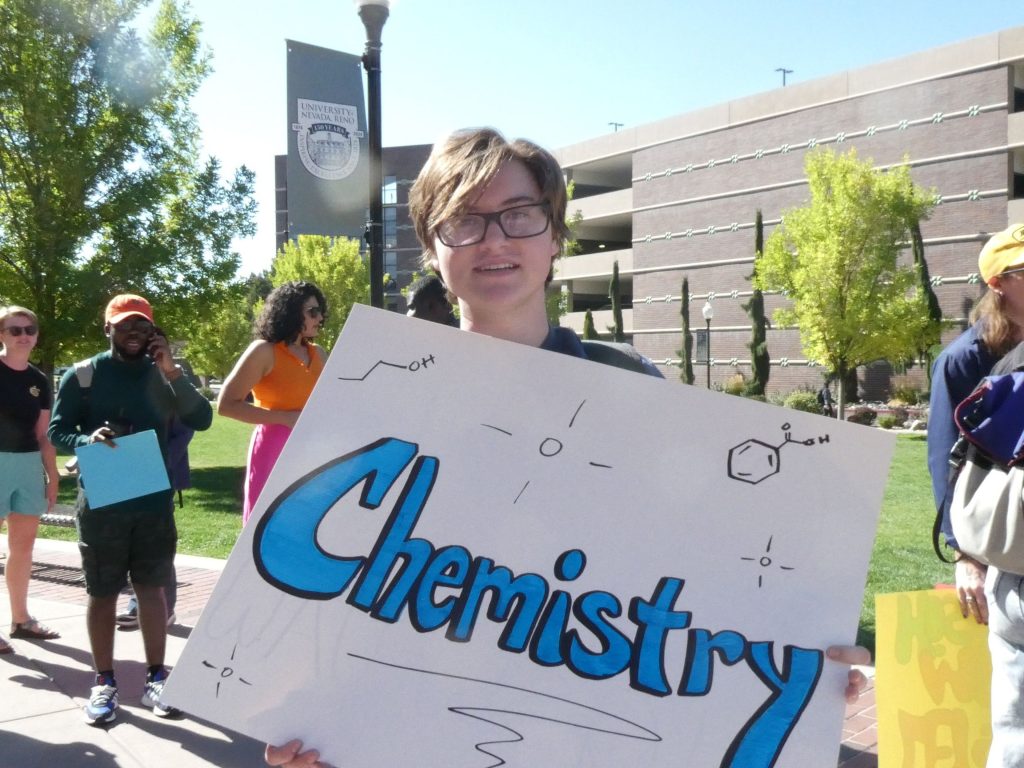Leaders of a unionization effort for graduate assistants at the University of Nevada, Reno, Desert Research Institute and University of Nevada, Las Vegas announced that they had reached supermajority support via the movement’s Instagram on Nov. 18.
Graduate Assistants (GAs) are graduate students who are paid tuition and a stipend in exchange for working for the university. A supermajority of these students, across three Nevada System of Higher Education institutions, signed forms showing their support for a potential union. Signature collection will end tomorrow, Nov. 21, according to a Nov. 19 announcement.
The union would operate under the national United Auto Workers union, which also backs similar GA unions at University of California schools, the University of Maine and the University of Alaska. Organizing GAs say it will be critical to securing better working conditions and better pay.
The movement at the University of Nevada, Reno will soon seek official recognition from the university, according to organizers. This could bring it one step closer to negotiating a new contract.
Rally kicks off a search for signatures
Dozens of graduate students gathered at the steps of the Mathewson-IGT Knowledge Center on Oct. 1 to hear guest speakers and to add their signatures to records that the organizers will eventually submit to the university when they seek official recognition.

GAs gather at the steps of the KC to show their support for a potential union.
It’s the culmination of an effort that’s been in the works since at least 2020 and recently picked up speed thanks to help from the national UAW, organizers said.
From there, according to Noel Vineyard, a GA in the geography department and organizer with the budding union, a few different things are possible.
The university could voluntarily recognize the union after it receives the signatures, which means the new union would go straight to negotiating a new contract for GAs with the university. The university may also decline to recognize the union, in which case organizers would turn to the upcoming session of the Nevada Legislature for recognition, Vineyard said.
Top issues for GAs at the rally included pay, as well as concerns about harassment and discrimination in the workplace. Concerns about protecting international students from such threats came to a head last year after a sexual assault scandal highlighted the unique precariousness faced by GAs working under a student visa.
“They’re kind of at the mercy of their advisors and so it kind of leads them to feel like they’re walking on eggshells,” Keely Rodriguez, a GA with the chemistry department and the union effort’s media liaison, said.

Signs for various departments were prepared for rally attendees.
Pay is also key for international GAs, as student visas don’t allow them to take on additional work off-campus. Base salaries for masters’ students range from $850-$1,700 a month, depending on how many hours they’re listed as working every week, according to public salary information available on the university’s website.
Median rent in Reno for a 1-bedroom apartment lands at about $1,300, according to real-estate aggregator Zillow as of Nov. 19. This rent comes in at 76% of the $1,700 salary for master’s degree-seeking student GAs working 20 hours a week.
The National Low Income Housing Association, a housing policy organization, classes any household that spends more than half of its income on rent as “severely cost burdened.”
“The university needs to meet the cost of living with the current inflation post-pandemic,” said Kaashifah, a GA with the College of Education and international student who spoke at the rally. “We can barely make a living out of it. COVID has changed the cost of living, the job market, and students are the ones who are at the bottom of that, and they’re suffering.”

Kipper Riemersma, a GA with the chemistry department, shows support for a union at the Oct. 1 rally.
Noah Nieman, a GA with the College of Engineering, said that he’s heard from a number of international student friends that the situation is unfair, and that he wants to be able to give them a better answer.
“I just have to say ‘that’s how it is,’ and I’m so tired of saying that,” Nieman said. “I’m so tired of saying that’s how it is and we can’t do anything about it.”
Will the university support them?
The potential union faces an uncertain response from administration, according to Markus Kemmelmeier, dean of the Graduate School and vice provost for Graduate Education.
Kemmelmeier told the Sagebrush that the ultimate decision on whether to recognize the union is for top leadership at the university to make, and that he couldn’t offer an indication of the eventual verdict.
From his perspective, Kemmelmeier said, putting pressure on the university for more resources won’t necessarily make them come graduate students’ way. Kemmelmeier added that he was part of a union during his own graduate studies at the University of Michigan.
“There’s nobody really hiding money under a cushion,” Kemmelmeier said. “There are not people really trying to not support graduate students or somehow holding them down.”
Kemmelmeier also added that the situation of GAs at the university is in no way unique, compared to the rest of the country.
“It is the typical thing that you’re poor as a graduate student,” Kemmelmeier said. “I have never encountered graduate students anywhere who didn’t really think they were poor…they get money enough that allows them to exist and do their studies; no frills, no luxuries.”
Kemmelmeier acknowledged that the administration can always do more when it comes to graduate students, emphasizing that concerned GAs can already speak to the university through the Graduate Student Association, a representative council elected from the graduate student body.
“There is a direct line where they can advocate their concerns,” Kemmelmeier said, “where they’re also being listened to, and where depending on the nature of the issue, action occurs.”
But Kaashifah, who previously served as vice president of the GSA during the 2020-21 academic year, said the role didn’t help her stand up for her peers.
“I could hardly do any help for students,” Kaashifah said. “As vice president of GSA, I hardly had any authority or strength or anything to do for them, so I think a union would give that extra strength and that extra power to fight for the students who are abused at work.”
None of the GAs who spoke to the Sagebrush said they’d faced any intimidation or hostility from their faculty advisors for organizing, or had personally faced workplace abuse, but many said they were concerned about peers who had.

An organizer stands ready to collect signatures at the Oct. 1 rally.
Overall, GAs said they were skeptical that the university would step up to support their union.
Seth McCoy, a GA in the College of Engineering, explained that majority support for the union would make it “bad optics” for the university to oppose it.
“At the same time, it’s a university trying to run itself like a business,” McCoy said. “They’re not really going to want the workers to unionize that much. If I had to be a betting man, I’d bet on them fighting it.”
Sterling Moore contributed reporting to this story.
Peregrine Hart can be reached via email at peregrineh@unr.edu or on Instagram @pintofperegrine.
